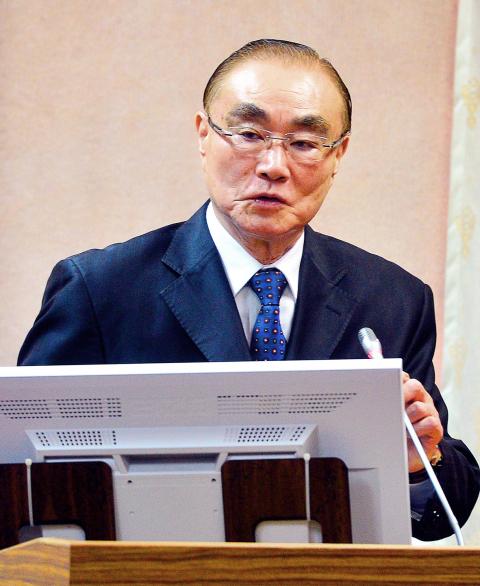The Ministry of National Defense yesterday confirmed for the first time that China has Dong Feng-16 (DF-16) missiles aimed at Taiwan in a bid to increase military pressure on the nation.
In a report delivered to the legislature’s Foreign and National Defense Committee, the ministry said Beijing has stepped up military threats toward Taiwan, pushing for military reforms and advancing its joint forces operations.
“In recent years, China’s navy and air force have introduced new warships, domestically produced fighter jets — including the Chengdu J-10, Shenyang J-11 and Shenyang J-15 — and Russian-made Sukhoi Su-35 multipurpose fighter jets, and put its latest stealth fighter, the J-20, into service,” the ministry said.

Photo: Wang Yi-sung, Taipei Times
The Chinese People’s Liberation Army Rocket Force has deployed DF-16 ballistic missiles, capable of conducting precise strikes on Taiwan proper, it added.
According to military sources, the DF-16 medium-range ballistic missile is guided and can carry multiple warheads, making it much more difficult to intercept.
Minister of National Defense Feng Shih-kuan (馮世寬) said recent events indicate that Beijing is seeking to stir up domestic discontent in Taiwan by increasing its military activities to force Taipei to fall in line with its cross-strait policy.
Feng cited as examples China’s first and only aircraft carrier, the Liaoning, passing through the first island chain in international waters off eastern Taiwan in December last year, as well as retired Chinese military officers’ repeated warnings about the risks of military conflict across the Taiwan Strait.
Responding to a question from Democratic Progressive Party (DPP) Legislator Liu Shih-fang (劉世芳) about Taiwan’s ability to intercept and counter DF-16 missiles, Feng said the Patriot Advanced Capability-3 (PAC-3) missile systems can meet the task.
“As the DF-16 is released at a high altitude and targets a single area, we are able to counter the missile as it passes through the atmosphere,” Feng said.
Lieutenant General Chiang Chen-chung (姜振中), director of the ministry’s Office for Operations and Planning, said the PAC-3 missile system can effectively take down the DF-16 when it is flying between 40km and 70km away, preventing it from hitting Taiwanese soil.
To improve the nation’s integrated air defense capabilities and in response to an increased Chinese military presence in the area, the ministry earlier this month said that it has deployed PAC-3 missile batteries to Hualien and Taitung counties.
Dismissing US President Donald Trump’s reported plans to announce new arms sales to Taiwan after a proposed meeting with Chinese President Xi Jinping (習近平) next month, Feng said the government has yet to talk to Washington about weapons needs.
“Our policy is to consider any kinds of weapons that can truly increase the nation’s defensive capabilities,” Feng said, expressing hope that the US would authorize a large arms sale package soon.
Additional reporting by Lo Tien-bin

LONG FLIGHT: The jets would be flown by US pilots, with Taiwanese copilots in the two-seat F-16D variant to help familiarize them with the aircraft, the source said The US is expected to fly 10 Lockheed Martin F-16C/D Block 70/72 jets to Taiwan over the coming months to fulfill a long-awaited order of 66 aircraft, a defense official said yesterday. Word that the first batch of the jets would be delivered soon was welcome news to Taiwan, which has become concerned about delays in the delivery of US arms amid rising military tensions with China. Speaking on condition of anonymity, the official said the initial tranche of the nation’s F-16s are rolling off assembly lines in the US and would be flown under their own power to Taiwan by way

CHIP WAR: The new restrictions are expected to cut off China’s access to Taiwan’s technologies, materials and equipment essential to building AI semiconductors Taiwan has blacklisted Huawei Technologies Co (華為) and Semiconductor Manufacturing International Corp (SMIC, 中芯), dealing another major blow to the two companies spearheading China’s efforts to develop cutting-edge artificial intelligence (AI) chip technologies. The Ministry of Economic Affairs’ International Trade Administration has included Huawei, SMIC and several of their subsidiaries in an update of its so-called strategic high-tech commodities entity list, the latest version on its Web site showed on Saturday. It did not publicly announce the change. Other entities on the list include organizations such as the Taliban and al-Qaeda, as well as companies in China, Iran and elsewhere. Local companies need

CRITICISM: It is generally accepted that the Straits Forum is a CCP ‘united front’ platform, and anyone attending should maintain Taiwan’s dignity, the council said The Mainland Affairs Council (MAC) yesterday said it deeply regrets that former president Ma Ying-jeou (馬英九) echoed the Chinese Communist Party’s (CCP) “one China” principle and “united front” tactics by telling the Straits Forum that Taiwanese yearn for both sides of the Taiwan Strait to move toward “peace” and “integration.” The 17th annual Straits Forum yesterday opened in Xiamen, China, and while the Chinese Nationalist Party’s (KMT) local government heads were absent for the first time in 17 years, Ma attended the forum as “former KMT chairperson” and met with Chinese People’s Political Consultative Conference Chairman Wang Huning (王滬寧). Wang

CROSS-STRAIT: The MAC said it barred the Chinese officials from attending an event, because they failed to provide guarantees that Taiwan would be treated with respect The Mainland Affairs Council (MAC) on Friday night defended its decision to bar Chinese officials and tourism representatives from attending a tourism event in Taipei next month, citing the unsafe conditions for Taiwanese in China. The Taipei International Summer Travel Expo, organized by the Taiwan Tourism Exchange Association, is to run from July 18 to 21. China’s Taiwan Affairs Office spokeswoman Zhu Fenglian (朱鳳蓮) on Friday said that representatives from China’s travel industry were excluded from the expo. The Democratic Progressive Party government is obstructing cross-strait tourism exchange in a vain attempt to ignore the mainstream support for peaceful development